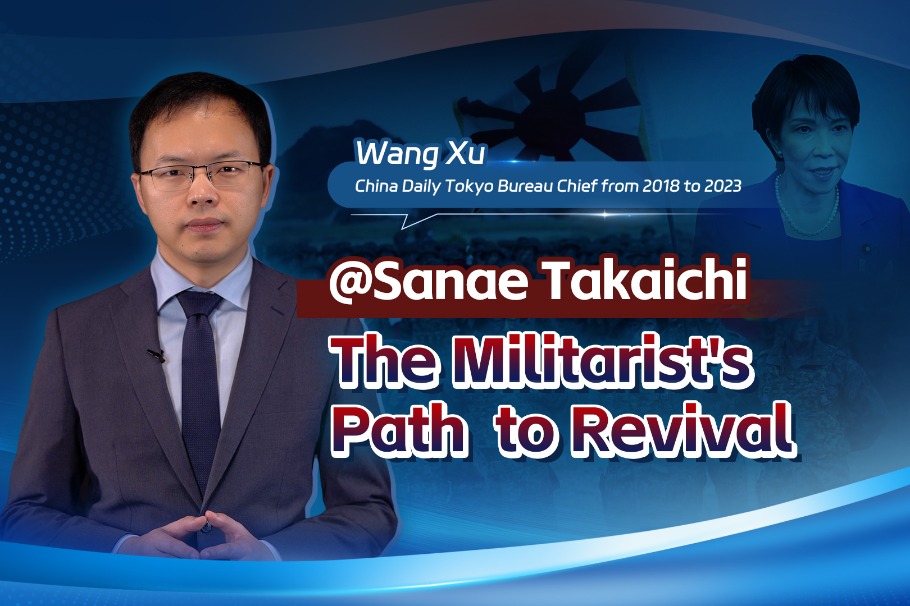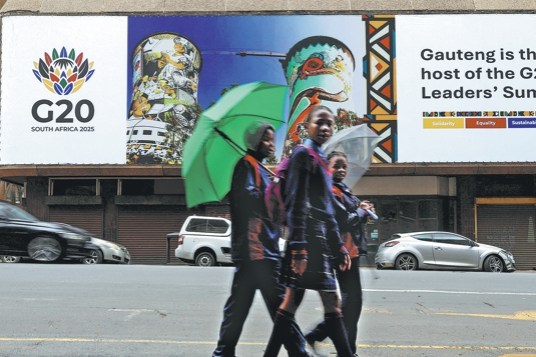Fresh momentum for reforming global governance
The GGI injects fresh intellectual momentum into the cause of building a more just and equitable global governance system


As the world enters a period of turbulence and transformation, the United Nations, as well as the principle of multilateralism, are facing mounting challenges eight decades after its founding. At this pivotal moment, Chinese President Xi Jinping proposed the Global Governance Initiative, offering China's solutions for addressing the world's governance challenges.
The Global Governance Initiative has five core principles: staying committed to sovereign equality, international rule of law, multilateralism, the people-centered approach and real results. These principles embody deep insight, emphasize problem-solving, reflect a systems-oriented perspective, and balance both root causes and immediate issues. Together, they form a comprehensive, well-structured and coherent framework.
The Global Governance Initiative is rooted in the UN Charter and inherits China's diplomatic traditions. Guided by the vision of a shared future, the initiative outlines the principles, methods and pathways for reforming global governance. In doing so, China offers another major global public good, injecting fresh intellectual momentum into the cause of building a more just and equitable global governance system.
China is not only the proposer of the Global Governance Initiative, but also an active participant with a strong sense of responsibility, committed to transforming road maps into working plans and turning aspirational goals into concrete achievements.
China has long been a steadfast defender of a UN-centered international system. China has maintained robust cooperation with the organization. It is the second-largest contributor to the UN's regular and peacekeeping operations budgets, leads the implementation of the 2030 Agenda for Sustainable Development and actively participates in the Human Rights Council.
Since its launch a decade ago, the China-UN Peace and Development Fund has supported more than 200 projects across over 100 countries, advancing major UN initiatives. China continues to expand its engagement in the international system. It has joined nearly all universal intergovernmental organizations and more than 600 international conventions and concluded over 27,000 bilateral treaties, setting an example for upholding the UN-centered international order. Besides, China actively participates in the formulation of the United Nations' Global Digital Compact and the United Nations' Recommendation on the Ethics of Artificial Intelligence. Adhering to the principles of mutual respect and equality, China seeks to strengthen communication and cooperation with countries worldwide in cyberspace.
As an important member of the Global South, China has always stood firmly with other developing countries. It remains committed to promoting solidarity and cooperation, enhancing the Global South's influence, voice and representation, and advancing a more balanced and effective global governance structure. In recent years, China has been engaging in international cooperation on internet-based poverty alleviation, providing financing support for information industry modernization projects in African countries. Through Africa-China digital cooperation and poverty alleviation programs, some African countries can have universal and affordable internet access that improves the digital literacy among local communities.
China has helped drive the historic expansion of BRICS, promoted high-quality "BRICS+"cooperation, and developed the Shanghai Cooperation Organization into the largest regional international organization by both population and territory. By strengthening Global South cooperation platforms, China amplifies the "voice of the Global South" on major governance issues.
China, along with other emerging markets and developing countries, has made contributions to the establishment of the BRICS New Development Bank, the first multilateral development institution founded and led by emerging markets. China also supported the SCO Tianjin Summit decision to create an SCO development bank to bolster infrastructure construction and socioeconomic development among member states.
China was the first country to explicitly support the African Union's entry into the G20. It has launched 10 partnership actions to take with Africa for modernization, five programs with Latin American and Caribbean countries, five cooperation frameworks with Arab states and six platforms for cooperation with the Pacific Island countries, taking concrete actions to strengthen solidarity, cooperation and development across the Global South.
China is actively engaging in the international cooperation on global governance. As a major power with one of the strongest records in peace and security, China has been a proactive force for global peace. Chinese "Blue Helmets" have become a key pillar of UN peacekeeping operations, bringing hope to conflict-affected zones around the world.
China has explored unique approaches for resolving complex international issues. Upholding objectivity and fairness, China has promoted the political settlement of the Ukraine crisis and the Israel-Palestine conflict. It has also facilitated the historic reconciliation between Saudi Arabia and Iran, and played a constructive role in helping Cambodia and Thailand peacefully resolve their border dispute.
China has expanded high-level, institutional opening-up by hosting the China International Import Expo, expanding a global network of high-standard free trade zones, and implementing the Regional Comprehensive Economic Partnership to a high standard.
To support the global sustainability agenda, China has set dual carbon goals — peaking carbon dioxide emissions before 2030 and achieving carbon neutrality before 2060, driving progress toward the Paris Agreement and the Kunming-Montreal Global Biodiversity Framework, and establishing the Kunming Biodiversity Fund.
In the field of international rule of law, China has worked with 32 countries to establish the International Organization for Mediation, providing a new mechanism for the efficient and peaceful settlement of international disputes.
China has also taken the lead in the global governance of artificial intelligence, proposing the Global AI Governance Initiative to ensure that "AI always develops in a way that is beneficial to human civilization".
The fourth plenary session of the 20th Central Committee of the Communist Party of China proposed recommendations for formulating the 15th Five-Year Plan (2026-30), charting a blueprint for China's economic and social development in the next five years and a promising vision for win-win cooperation between China and the rest of the world. The Communiqué of the Fourth Plenary Session of the 20th CPC Central Committee stressed that China should "promote high-standard opening up and create new horizons for mutually beneficial cooperation" and "secure further progress in building a community with a shared future for humanity".
Resonating with these goals and the aspirations of people worldwide, the Global Governance Initiative injects new momentum for reforming global governance, fosters a fairer and more just global system and helps build a future of peace, security, prosperity and progress for all.

The author is the director of the Comprehensive Research Office at the Xi Jinping Thought on Diplomacy Studies Center. The author contributed this article to China Watch, a think tank powered by China Daily.
The views do not necessarily reflect those of China Daily.
Contact the editor at editor@chinawatch.cn.

































